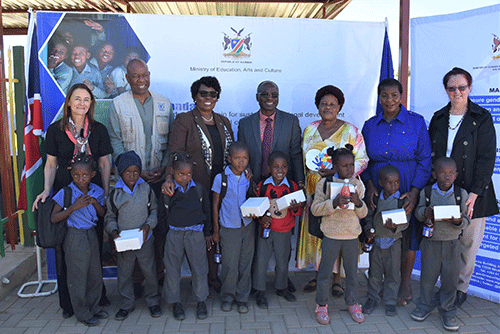Lahja Nashuuta
The European Union has allocated a combined N$320 million to the Ministry of Education, Arts, and Culture and the Ministry of Gender Equality and Child Welfare, aimed at supporting early childhood development and pre-primary education.
Ana-Beatriz Martins, ambassador of the EU delegation to Namibia, made the announcement last week during the EU launch of the Early Childhood Development (ECD) budget support event held at Mix Primary School in Windhoek.
Beatriz Martins indicates that of the total funds, N$262 million will go directly to the Namibian Treasury, whereas N$60 million is meant for technical assistance, including support actions implemented by Unicef and WFP.
She further said this year’s budget focuses more on inclusiveness and equity for children from disadvantaged households.
“We all know that far too many children have no access to ECD and pre-primary education — in fact, less than 25% of the children aged three to four. That is why we want to reach out to the most vulnerable children, for whom access is even more challenging so that they have equal chances for a good start in life and the opportunity to develop their full potential,” said Beatriz Martins.
Welcoming the new budget, the minister of gender equality, Doreen Sioka revealed that with the EU funding, lots of projects and programmes have been attained.
Sioka revealed that the European Union’s donation has led to the construction of 48 ECD centres and the upgrading and renovation of 42 ECD centres in all 14 regions to the tune of N$57 million.
With the EU funds, Sioka indicates 2 633 ECD centres were supported with teaching and learning materials as well as with protective preventative equipment in response to the Covid-19 pandemic.
In addition, the ministry trained 304 ECD educators in the ECD Basic Curriculum (in-service training).
The Integrated Early Childhood Development Framework, Early Childhood Development Basic Curriculum Training Manual, the ECD subsidy guidelines, the zero–two years’ curriculum, and the Early Childhood Development Management Information System were developed and reviewed.
Sioka further pointed out that with EU funds, the ministry has managed to intensify the implementation of the Right Start Campaign, highlighting the importance of ECD, which resulted in the enrolment of children increasing to figures exceeding those before Covid-19, slowly picking up in 2022 and 2023, respectively.
The budget is meant to improve the quality of learning and teaching in ECD centres, especially the community-based ECD centres, through the provision of teaching and learning materials and the construction of playgrounds at ECD centres.
A portion of the budget will be channelled towards strengthening the capacity of educators through the provision of qualifying training based on the reviewed and Registered ECD Unit Standards and the finalisation of the National Integrated Early Childhood Development Policy and its Costed Implementation Plan.
Sharing the funding’s tangible achievement, the minister of education, Anna Nghipondoka said, that for the 2019/2020 financial year, the education ministry received N$85 million, while during the 2021/2022 financial year, N$54 million was allocated for the construction of pre-primary schools, of which part of the funds went to pre-primary teachers’ capacity building and training literacy and numeracy skills.
-lnashuuta@gmail.com


